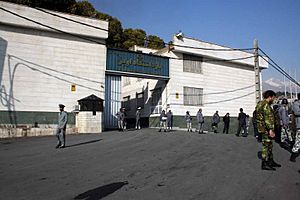Zahra Kazemi facts for kids
Quick facts for kids
Zahra Kazemi
|
|
|---|---|

Kazemi before her arrest (BBC)
|
|
| Born | 1948 Shiraz, Iran
|
| Died | 11 July 2003 (aged 55) Evin Prison, Tehran, Iran
|
| Resting place | Shiraz, Iran |
| Nationality | Iranian-Canadian |
| Education | University of Paris |
| Occupation | Photojournalist |
| Children | 1 |
| Awards | Tara Singh Hayer Memorial Award (2003) |
Zahra "Ziba" Kazemi-Ahmadabadi (Persian: زهرا کاظمی احمدآبادی; 1948 – 11 July 2003) was an Iranian-Canadian freelance photojournalist. She gained notoriety for her arrest in Iran and the circumstances in which she was held by Iranian authorities, in whose custody she was killed.
Although Iranian authorities insist that her death was accidental and that she died of a stroke while being interrogated, Shahram Azam, a former military staff physician who used his purported knowledge of Kazemi's case for seeking asylum in Canada in 2004, has stated that he examined Kazemi's body and observed that she showed obvious signs of torture.
Her death was the first time that an Iranian death in government custody attracted major international attention. Because of her dual citizenship and the circumstances of her death, she has since become an international cause célèbre. In November 2003, Canadian Journalists for Free Expression honoured Kazemi with the Tara Singh Hayer Memorial Award in recognition of her courage in defending the right to freedom of expression.
Contents
Life and death
Kazemi was born in Shiraz, Iran, and moved to France in 1974 to study literature and cinema at the University of Paris. With her son, Stephan Hachemi, she immigrated to Canada in 1993 and settled in Montreal, Quebec, where she later gained Canadian citizenship and became a dual citizen. She worked in Africa, Latin America, and the Caribbean and then more frequently in various Middle Eastern countries, including the Palestinian territories, Iraq, and Afghanistan. She visited the latter two countries both before and during the American occupation. Immediately before her traveling to Iran, Kazemi revisited Iraq, documenting the U.S. occupation. Recurrent themes in her work were the documentation of poverty, destitution, forced exile and oppression, and also the strength of women in these situations.
Arrest

Traveling back to her birth country using her Iranian passport, Kazemi was allowed into Iran to take photographs of the possible demonstrations that were expected to take place in Tehran in July 2003. The demonstrations took place and were effectively crushed after the sixth day by a massive deployment of security forces and paramilitary vigilantes, or "plainclothesmen." Following the clampdown, an estimated 4000 students "had gone missing" and were thought to have been arrested for protesting and taken to Evin prison, Tehran's political prisoner detention facility. As was customary after such events, family members of the missing gathered outside of Evin prison in the north of Tehran in hopes of learning what had happened to their children. On 23 June 2003, Kazemi drove to the prison to take pictures of these family members, possessing a government-issued press card that she thought made it permissible for her to work around Tehran, including at Evin.
According to Shirin Ebadi, an Iranian lawyer and former judge who won the Nobel Peace Prize in 2003 and later became the main representative of Kazemi's family at the trial over Kazemi's death, a prison staff member saw Kazemi taking photographs and demanded that she give him her camera, as photography is prohibited in front of the prison.
Worried that officials might harass the families whose photos she had already taken, she flashed her press card and exposed the film to the light. The guard angrily yelled at her, ‘I didn't ask you to expose your film, I told you to give me your camera’ ‘You can have the camera,’ she retorted, ‘but the film belongs to me.’ She was detained and interrogated over the next three days by police officers, prosecutors, and intelligence officials.
The Evin prison staff, whom the Kazemi family's lawyers consider a party in the beatings that led to Kazemi's death, say that she had been in a sensitive area, photographing parts of the prison. Several days after her arrest, hardline newspapers ran stories "calling her a spy who had entered the country undercover as a journalist."
Kazemi insisted that she did not photograph any part of the prison, only the street and the demonstrators, who were family members of activist students jailed in prison.
Death
On 11 July 2003, nineteen days after she was arrested, Kazemi died in Iranian custody in Baghiyyatollah al-Azam Military Hospital. Two days later, Iran's official IRNA news agency reported that Kazemi had suffered a stroke while she was being interrogated and died in hospital. This account changed to one that Kazemi had died after falling and hitting her head. On 16 July 2003, Iran's vice-president, Mohammad Ali Abtahi, "conceded that Kazemi died as a result of being beaten". Mohammad Ali Abtahi (Vice President of Legal Affairs) and Masoud Pezeshkian (Minister of Health and Medical Education) admitted that she died of a fractured skull as a result of being hit in the head. Abtahi claims that he was under a lot of pressure to take back the acknowledgment, but he resisted it.
Shirin Ebadi reports that security officials searched the house of an unnamed friend that Kazemi had been staying at and "kept asking" her friend about Kazemi's "‘medical condition’ and what medicines she took daily." Officials also kept Kazemi's elderly, frail mother, who had journeyed from Shiraz to see her only child, from seeing Kazemi until they had questioned her about the medicines they insisted her daughter must be using. Kazemi's friend told Ebadi that she later realized this meant Kazemi was dead, and the officials "wanted to claim that Ziba had a preexisting condition that had simply worsened in prison."
The story did not become a major controversy until almost two years later, when Shahram Azam, a former staff physician in Iran's Defence Ministry, released a statement saying that he examined Kazemi in hospital four days after her arrest and found obvious signs of torture.
Aftermath
In June 2005, an exhibition at the municipal Côte-Saint-Luc Library in Montreal of photos taken by Zahra Kazemi during her travels in Middle East was shut down following accusations by Jewish patrons of alleged "pro-Palestinian bias" for including five of her photographs on display that depicted scenes inside Palestinian refugee camps. Gallery officials proceeded to remove the five photographs while leaving the rest of the exhibition. In response, Kazemi's son, Stephen Hachemi, called the removal of the Palestinian photographs "a violation of my mother's spirit" and demanded that the library either display the entire collection or nothing at all. Eventually, the library closed the entire exhibition.
Côte Saint-Luc Mayor Robert Libman told CBC news "It's a very complicated conflict, and to create an impression where the Palestinian cause is being martyred by oppression by the Israeli government, we don't consider that to be a fair portrait, in the future, such politically charged work won't be displayed at the library". Critics of the decision to take down the exhibition denounced it as "censorship". Naomi Klein and Aaron Maté wrote that it is "part of a disturbing pattern to silence opposition to the expansionist Israeli occupation of the Occupied Territories". According to the caption that accompanied the photo exhibition, she "illustrated the daily life of Palestinians and the problems they faced as they sought to preserve their land and their identity" in the face of "exodus, poverty, humiliation, suffering, and the ravages of war".
Her life was one of the inspirations for the popular webcomic, Zahra's Paradise.
See also
- Human rights in Iran
- List of famous Persian women
- List of foreign nationals detained in Iran
- Zahra Bani Yaghoub

